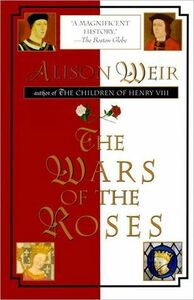You need to sign in or sign up before continuing.
Take a photo of a barcode or cover
adventurous
challenging
dark
emotional
informative
sad
tense
slow-paced
This is one of Weir’s best histories. I learned so much! Lots of ground to cover in this one, especially with the back and forth depositions of Henry VI, but I feel the book is written in a way that makes all the conflicts easier to understand.
Very easy to read history of England's civil wars. Honest characterizations of the principals, giving the reader both the good and not so good personality traits. military and political details are well researched and plainly described.
slow-paced
Very informative and well-written account of the period, certainly filled in some gaps in my knowledge! On the whole i enjoyed listening to this in my car - the audiobook experience was a winner! Some people found the narrator's tendency to "do the voices" a bit wearing but personally I liked it.
The only thing that did irritate slighlty was the "translation" of money e.g. "The fireplace cost £32, 10s and 6d (that's £32 and 52 and a half pence)"! If you have to do price translations it would be a lot more useful to explain the value of the money e.g. "£32, 10s and 6d, which would have paid an average wage for a bricklayer for 7 months" or something. Anyway, that's my only whinge and it's a pretty trivial one...
The only thing that did irritate slighlty was the "translation" of money e.g. "The fireplace cost £32, 10s and 6d (that's £32 and 52 and a half pence)"! If you have to do price translations it would be a lot more useful to explain the value of the money e.g. "£32, 10s and 6d, which would have paid an average wage for a bricklayer for 7 months" or something. Anyway, that's my only whinge and it's a pretty trivial one...
informative
slow-paced
informative
slow-paced
I loved this book! Alison Weir makes the people in history very real and interesting. I also really like how she is able to explain the complicated family, social, and realationship issues and dynamics surrounding the Wars of the Roses. She is also one of the more unbiased historical writers that I have found, stating facts and research from all points of view. A lot of books that I have read take sides in the Wars, Lancaster, York, or Tudor, and confusing an already confusing situation.
I will say that if you don't like history this is not going to be a fun read for you. "Wars of the Roses" is fascinating, but due to the times it is about, it is complicated and filled with names, dates, changing titles, and changing alliances. I couldn't put it down.
I will say that if you don't like history this is not going to be a fun read for you. "Wars of the Roses" is fascinating, but due to the times it is about, it is complicated and filled with names, dates, changing titles, and changing alliances. I couldn't put it down.
I'm kind of stunned at how enthralled I was by this book. I'm not usually much of a nonfiction reader, but I found this fascinating. I'm certain it helped that I knew almost nothing about the time, so I could read with a fair amount of suspense. It also helped to know that the Wars were an inspiration for "Game of Thrones", and I could say things to myself like "Okay so Margaret of Anjou is basically Cersei Lannister without the incest, got it." The author moved things along quite quickly, and covered almost a century of history in just over 400 pages, which kept things from getting dry. I did have to do a fair amount of flipping between the family trees and the index and the text to remember who all the various nobles were, but that's to be expected. Highly recommend. Be aware, though, that this book only goes through the 1470s, and does not include the juicy bits with Richard III and the murder of the princes. But fear not, Weir wrote a book on that, too, which I'm starting next.
Hard to rate, because it's a perfectly fine and incredibly researched book but I had some issues. This took a while to read. It's everything you've ever wanted to know about the wars of the roses and are astonished to know that they actually know and in fact it's probably far more than I've ever needed to know or will possibly retain. I had two main quibbles...one are the family trees which appear to be handwritten and in my copy were barely readable, and the author's CONSTANT use of a person's title rather than their name. A person could die and their son inherit the title and now we are talking about two different people, I mean if you were writing a history of England in the 20th century and you said "York", are you talking about George V, George VI or Prince Andrew, they are all "York". And then you can't review these people because you can't read the family tree and if you try to look them up in the index it won't be where you look, it will say "See blah blah, you sucker who can't keep the titles straight." and eventually fatigue set in and I wouldn't care anymore and would give up on who Somerset happens to be today. Also battles. I have come to the conclusion that the part of one's brain that enables one to read about battles and understand what is going on is the same part of the brain that deals with math, and that part of my brain is missing. So I have a problem reading about military stuff, whatever war it might be. I do keep trying but I inevitably fail, can't work with a actual missing brain part, after all. There is a lot of battle stuff in here. I read it, but don't give me a quiz.
Too dry, made it hard to be interested, even for those who love the period.



